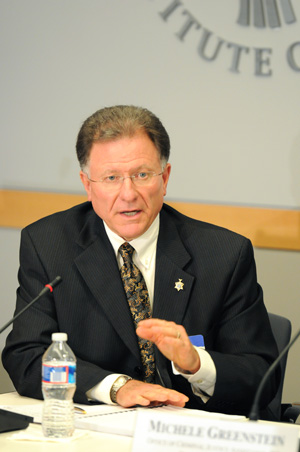Foreign Police Assistance: Lessons from the Field
Seven U.S. federal agencies spend billions annually on training and equipping foreign police. On July 8, field experts from USAID, the Justice Department, the Defense Department, and USIP examined innovative new approaches to U.S. foreign police assistance and introduced USAID's new Field Guide.

Seven U.S. federal agencies collectively spend billions of dollars annually on training and equipping police in Afghanistan, Iraq, Pakistan, Mexico, Colombia, and elsewhere abroad. Indeed, effective, accountable local police are a vital stopgap against terrorism, narcotics-trafficking and crime. Yet, U.S. approaches toward civilian law enforcement assistance vary considerably from country to country, mission to mission, and agency to agency.
On July 8, the U.S. Institute of Peace brought together field experts from USAID, the Department of Justice, and the Department of Defense to examine various approaches to U.S. law enforcement assistance. The session introduced USAID’s newly released Field Guide for USAID Democracy and Governance Officers: Assistance to Civilian Law Enforcement in Developing Countries. In addition, USIP presented lessons learned from police participation in its justice and security dialogues in Nepal and other countries.
Watch CSPAN's video recording of this event
Speakers
- David Yang, Introduction
Director of the Office of Democracy, Human Rights and Governance, Bureau for Democracy, Conflict and Humanitarian Assistance, USAID - John Buchanan, Panelist
Author, Field Guide for USAID Democracy and Governance Officers: Assistance to Civilian Law Enforcement in Developing Countries
Deputy Director, International Criminal Investigative Training Assistance Program, U.S. Department of Justice - Lieutenant General James Dubik, Panelist
Senior Fellow, Institute for the Study of War
Former Commander, Multi National Security Transition Command-Iraq - Michele Greenstein, Panelist
Deputy Director, Office of Criminal Justice Assistance and Partnership, Bureau of International Narcotics and Law Enforcement Affairs, U.S. Department of State - Colette Rausch, Panelist
Director, Rule of Law Center, U.S. Institute of Peace - Robert Perito, Moderator
Director, Security Sector Governance Center, U.S. Institute of Peace
Explore Further
- USAID's Field Guide for USAID Democracy and Governance Officers: Assistance to Civilian Law Enforcement in Developing Countries
- USIP's Security Sector Governance Center



